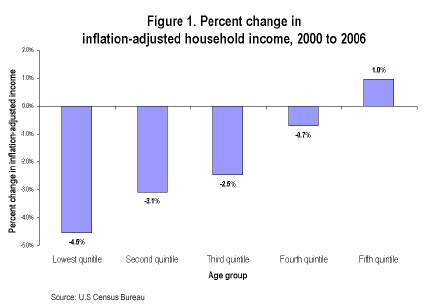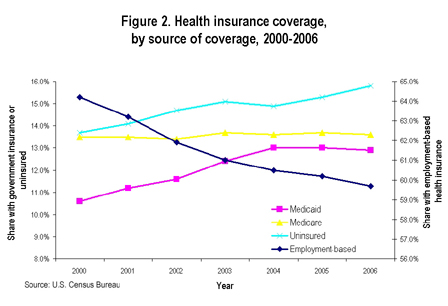August 30, 2007
Heather Boushey
AlterNet, August 30, 2007
See article on original website
Global markets have been volatile over the past month and mainstream economists are now talking about whether recession may be just around the corner. A recession would certainly not be good news for America’s working families, especially since most have not yet recovered from the last one.
The current economic rebound, which began in the middle of 2001, has been relatively weak, generating fewer jobs and less income growth than previous recoveries. And, companies have not been offsetting lower wages with better benefits. The opposite is true; the number of working people who get healthcare from their employers has fallen sharply in recent years.
On Aug. 28, the U.S. Census Bureau released its latest numbers on income and poverty. According to the data, despite the fact that the median household saw its income grow by 0.7 percent between 2005 to 2006, it remained 2.0 percent below where it had been in 2000, at the last economic peak. So far, this recovery has generated less income growth than prior ones: at this point in the recovery of the 1990s, household income was only 1.3 percent below its prerecession peak and at the comparable point in 1980s, household income was only 0.9 percent below its prerecession peak.
And what growth we have seen in family income has gone mostly to those at the very top of the income distribution. Since 2000, families in the top fifth of the economic ladder have seen their income rise by 1.0 percent — they were the only ones to see any growth at all — while those in the bottom fifth saw theirs fall by 4.5 percent [See Figure 1].
What’s more, it’s been more work, not rising earnings, that have pushed incomes up at all. From 2005 to 2006, median full-time earnings fell for both male and female workers by over a percent (1.1 percent for men and 1.2 percent for women). This is the third year in a row that median earnings have fallen. Employment rates are higher for both men and women, indicating that families are coping with lower earnings by simply working more. All of this is not very good news. By these measures, the current recovery has been inadequate for millions of families. It also indicates that the data for 2007 may not be that much better. In 2006, hourly wages increased sharply in the last half of the year and, as a result, 2006 was the first year in three years to show growth in inflation-adjusted weekly earnings. While inflation-adjusted hourly wages fell in early 2007, they are now growing but at a slower pace than in late 2006.
But wages and incomes are not the whole story. As we’ve moved through this economic recovery, access to health insurance has become increasingly a tale of the haves and the have-nots. Between 2000 and 2006, the share of people with employment-based health insurance has fallen from 64.2 to 59.7 percent, and the share without health insurance is now at 15.8 percent, an all-time high [See Figure 2].
There would be more uninsured among us except that in the late 1990s, Congress extended Medicaid to the children of workers under the State Child Health Insurance Program (SCHIP). This program must be reauthorized by the end of September or it will expire. While both houses of Congress have passed a reauthorization bill, the president has threatened a veto because the bill will further increase children’s access to government health insurance. According to the president’s spokesperson, Mr. Fratto, “This will have the effect of encouraging many to drop private coverage, to go on the government-subsidized program.”
It appears that this logic is backwards. Between 2000 and 2006, the share of children with employment-based health insurance fell by 6.2 percent. If this were a clear story of families swapping their employment-based coverage for Medicaid, there would not have been similar declines in employment-based coverage for adults. But, in fact, employment-based coverage fell for adults by just as much as for children. Since most adults are ineligible for Medicaid, they are now swelling the ranks of the uninsured, while mostly because of the SCHIP expansion, the share of children with government health insurance rose by 6.8 percent between 2000 and 2006. Yet, even with the SCHIP expansion, there are more children without health insurance: From 2005 to 2006, the number of uninsured children increased from 8 million (10.9 percent) to 8.7 million (11.7 percent).
We need an economy that works for all. When the economy grows, we should expect–even demand–that earnings rise. When earnings do not grow, asking families to shoulder the burden of the increased costs of health insurance and the declines in employment-based coverage is only adding to our problems, not solving them. It’s not that the government health insurance is crowding out private coverage, but that employment-based health insurance has fallen and Medicaid and SCHIP have helped to close the gap so that many in the very poorest families can access healthcare.
Healthcare should be a right for all families, not just the very poor and those lucky enough to have a good job with benefits. Expanding SCHIP to cover all children, or, better yet, expanding Medicare to all of us, young and old alike, would help families weather the vicissitudes of the economic cycle without having to worry about their health.
Heather Boushey is a senior economist at the Center for Economic and Policy Research in Washington, D.C.








